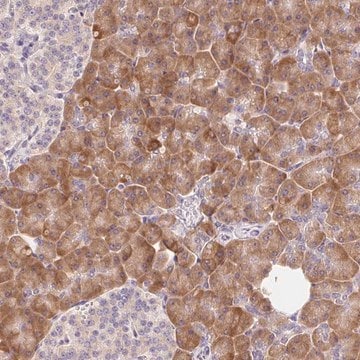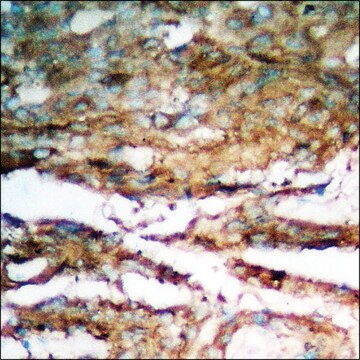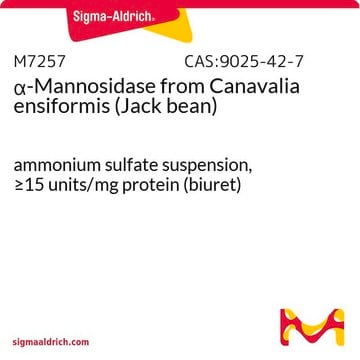MAB394-100UG
Anti-Dopamine β Hydroxylase-SAP Antibody, clone 4F10.2
clone 4F10.2, Chemicon®, from mouse
Sign Into View Organizational & Contract Pricing
All Photos(2)
About This Item
UNSPSC Code:
12352203
eCl@ss:
32160702
NACRES:
NA.41
Recommended Products
biological source
mouse
Quality Level
conjugate
saporin
antibody product type
primary antibodies
clone
4F10.2, monoclonal
species reactivity
rat
manufacturer/tradename
Chemicon®
technique(s)
immunolesioning: suitable
isotype
IgG1
NCBI accession no.
UniProt accession no.
shipped in
dry ice
target post-translational modification
unmodified
Gene Information
rat ... Dbh(25699)
Specificity
Dopamine b-HydroxylaseDBH is a single gene product that exists as a cytosolic enzyme, as a membrane protein and is secreted into the circulation (Lewis & Asnani, 1992). Because of its residence time as a plasma membrane-bound protein, it is able to be used as a targeting agent for neurons. The target neurons include postganglionic sympathetic neurons and all noradrenergic and adrenergic neurons of the central nervous system. As such anti-DBH-SAP can be used for the production of acute peripheral autonomic failure in a model for the human disease. It can also be used for the analysis of the behavioral effects of noradrenergic or adrenergic ablation. When injected intraventricularly, noradrenergic neurons of the locus coeruleus are eliminated (Wiley & Lappi, 1994). The antibody and immunotoxin undergo retrograde transport.
MAB308 is the unconjugated monoclonal.
MAB308 is the unconjugated monoclonal.
Application
Detect Dopamine β Hydroxylase using this Anti-Dopamine β Hydroxylase-SAP Antibody, clone 4F10.2 validated for use in 0.
Immunotoxin
Research Category
Neuroscience
Neuroscience
Research Sub Category
Neurodegenerative Diseases
Neurodegenerative Diseases
Physical form
Saporin Conjugated. Sterile liquid. Provided in phosphate buffered saline. Contains no preservative.
Storage and Stability
The material should be stored at -80°C for up to six months under sterile conditions. Avoid repeated freeze-thaw cycles.
Other Notes
Concentration: Please refer to the Certificate of Analysis for the lot-specific concentration.
Legal Information
CHEMICON is a registered trademark of Merck KGaA, Darmstadt, Germany
Disclaimer
Unless otherwise stated in our catalog or other company documentation accompanying the product(s), our products are intended for research use only and are not to be used for any other purpose, which includes but is not limited to, unauthorized commercial uses, in vitro diagnostic uses, ex vivo or in vivo therapeutic uses or any type of consumption or application to humans or animals.
Not finding the right product?
Try our Product Selector Tool.
Storage Class
12 - Non Combustible Liquids
wgk_germany
WGK 2
flash_point_f
Not applicable
flash_point_c
Not applicable
Certificates of Analysis (COA)
Search for Certificates of Analysis (COA) by entering the products Lot/Batch Number. Lot and Batch Numbers can be found on a product’s label following the words ‘Lot’ or ‘Batch’.
Already Own This Product?
Find documentation for the products that you have recently purchased in the Document Library.
Carolina Rocha-Pereira et al.
Journal of pharmacological sciences, 122(2), 59-70 (2013-06-21)
In hypertension, vascular reactivity alterations have been attributed to numerous factors, including higher sympathetic innervation/adenosine. This study examined the modulation of adenosine receptors on vascular sympathetic nerves and their putative contribution to higher noradrenaline spillover in hypertension. We assessed adenosine
C C Wrenn et al.
Brain research, 740(1-2), 175-184 (1996-11-18)
The ability to create lesions of discrete neuronal populations is an important strategy for clarifying the function of these populations. The power of this approach is critically dependent upon the selectivity of the experimental lesioning technique. Anti-neuronal immunotoxins offer an
Soluble and membrane-bound forms of dopamine beta-hydroxylase are encoded by the same mRNA.
Lewis, E J and Asnani, L P
The Journal of Biological Chemistry, 267, 494-500 (1992)
M J Picklo et al.
The Journal of pharmacology and experimental therapeutics, 275(2), 1003-1010 (1995-11-01)
Anti-dopamine beta-hydroxylase immunotoxin (DHIT) is an antibody-targeted noradrenergic lesioning tool comprised of a monoclonal antibody against the noradrenergic enzyme, dopamine beta-hydroxylase, conjugated to saporin, a ribosome-inactivating protein. Noradrenergic-neuron specificity and completeness and functionality of sympathectomy were assessed. Adult, male Sprague-Dawley
Our team of scientists has experience in all areas of research including Life Science, Material Science, Chemical Synthesis, Chromatography, Analytical and many others.
Contact Technical Service








